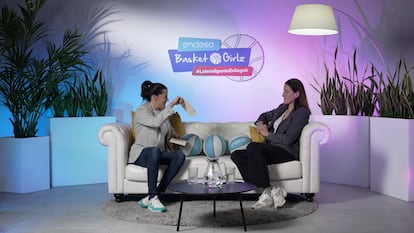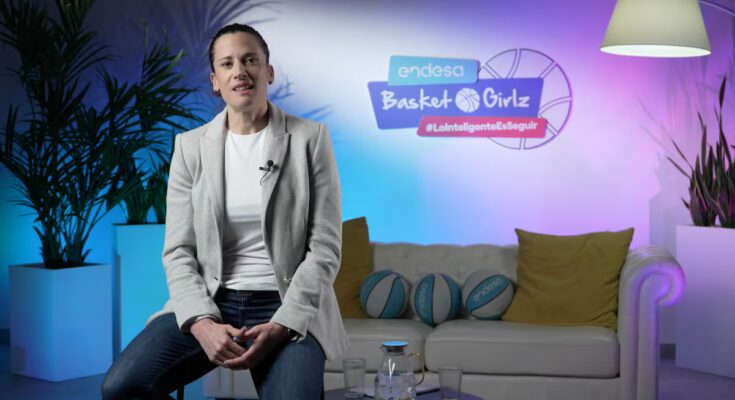Change your glasses so as not to avoid looking at a problem that really exists, even if not everyone is aware of it; This is the objective of the course program developed by former player and sports psychologist Mar Rovira: four out of five girls abandon playing basketball, any team sport, around the age of 16.
And they do so, as demonstrated by the report of the Basket Girlz initiative, conducted by Endesa in collaboration with the Spanish Basketball Federation (FEB), for reasons such as the difficulty of reconciling training and study or the lack of support from an environment that, even today, looks at boys and girls who play basketball differently. “If with this course they could wear my women’s glasses for a couple of minutes to look from here, I would be satisfied,” says Rovira.
Behind that glass the world seems different. From their point of view, there is no doubt that the premature abandonment of young footballers does not occur to the same extent (the data says so); that depriving them of sport is preventing the acquisition not only of a healthy habit that will accompany them into adult life, but of values that teach a lot about what happens off the field: teamwork, thinking about the group before oneself, improving oneself, learning from mistakes…
And to reverse what is happening and affects us all, the Basket Girlz project has created this course, which is part of the optional credits for FEB coaching levels and is designed as an educational capsule, but with a much greater ambition: to change the perspective of those who drive the foundations of basketball.
Those training to lead a team from the board and the bench will have access to these video teaching units held by the person who is now the head of the psychology and performance department at RCDE Espanyol in Barcelona, lessons which aim to provide them with the psychological and pedagogical tools so that, once qualified, they can be part of the solution. Because, as Mar Rovira indicates, “50% of a coach’s work, especially in the training categories, is motivation, and in this issue, first emotional and then rational, lies the key to stopping abandonment”.
Family support
“I provided a solid theoretical basis,” explains Rovira, “but with a playful approach. The coaches must understand that their role goes far beyond teaching technique or tactics, they must create the climate so that the girls want to return the following year. This will improve the competitive ambition of the team!”
In that decision, that of not leaving him, that of returning after the summer, if there are fundamental actors, they are the parents. Many still fall into the cliché: “Concentrate on your studies, nothing will happen if you miss training…” Rovira often turns to them in interviews and training sessions, because according to him an oriented family can be the most solid pillar: “They need to know what their daughters would miss, help them with time management. If you want to punish them without something they like: limit the use of screens, but don’t take away sport!”
In these educational capsules and in the Rovira repertoire, there are also useful guidelines for parents. An example. In Espanyol’s sports city, Rovira asks all players to leave their cell phones in a locker at the entrance. It sounds silly but, he says, it teaches them to disconnect. And some notice how they are suddenly better able to concentrate. “When they repeat the same gesture at home to study, when they move away from their cell phone, then they tell me that they concentrate better, that they have more hours. The question of time management is actually a question of creating habits,” explains Rovira, who insists that all these improvements in the routine are really crucial, is in the adolescence of boys and girls (“elite athletes have already learned their habits well,” says Rovira).
However, it is at these ages that fathers and mothers can help make sports a permanent part of their daughters’ lives. “If with these tips I can ensure that a single family does not neglect their daughter because afternoon training during the week and matches on Saturdays at nine in the morning are a nuisance, I will be happy,” says Rovira.
Coaches in training categories: another voice
The first time María Pina and Mar Rovira chatted was during a phone call. It would last ten minutes, a short survey. They spent more than two hours talking. Pina, like Rovira, is a former professional basketball player and today dedicates himself to coaching grassroots teams. And they share a similar diagnosis of the situation, which is why Endesa and FEB also decided to make use of Pina’s experience to include her in the process.
Youth coaches are the cornerstone of change. Many, as Rovira points out, “are too young and their perspective on life does not lead them to think about the long term”. “If they’re training at cadet level and, say, a young player leaves, it doesn’t affect them. They don’t see it as something that’s theirs.” An error. Continuity is everyone’s business.
Pina knows this and, day after day, she begins by helping her players to feel responsible within the team, so that they have room to make mistakes and grow at their own pace, paying attention to each one according to their needs: “I dedicate the same time to those who will at most improve to the point of knowing how to dribble with two hands as to those who can learn to shoot threes and win games”.
We do them a disservice, says Pina, when we protect them too much: parents who even carry their daughters’ backpacks or water bottles, for whom they solve every problem. With these girls it’s easier, obviously, when things go wrong, they get demotivated and give up. “For those who want to become youth coaches,” says Rovira, “I would recommend attending this course as compulsory.” “The learning of a boy and a girl does not follow different paths, but there are differences between players and women in the way they manage to dare, have fun and motivate themselves. They need these glasses.”
Other management
Rovira says that even today, as a woman leading a critical department of a high-performance men’s team, she sees how that power is tested time after time. His intelligence and communication skills in interpersonal relationships were his best allies in overcoming these attacks. Pina agrees: “The type of leadership in the sports environment is still very masculinized. I follow academies, clubs, federations on social networks… and I rarely see women in the talks or clinics they organize. This sends a message: this is not your place.”

For future coaches of the training categories this will be a key theme: giving space to more diverse and inclusive forms of leadership. “There is no single way to train, nor to win, there is no single path to success nor a single way to understand it,” explains Pina. Again the glasses to which Rovira referred: “We have learned to wear men’s glasses. In the training of coaches we must teach them how many beautiful things are missing. We must invite them to change glasses from time to time”.



